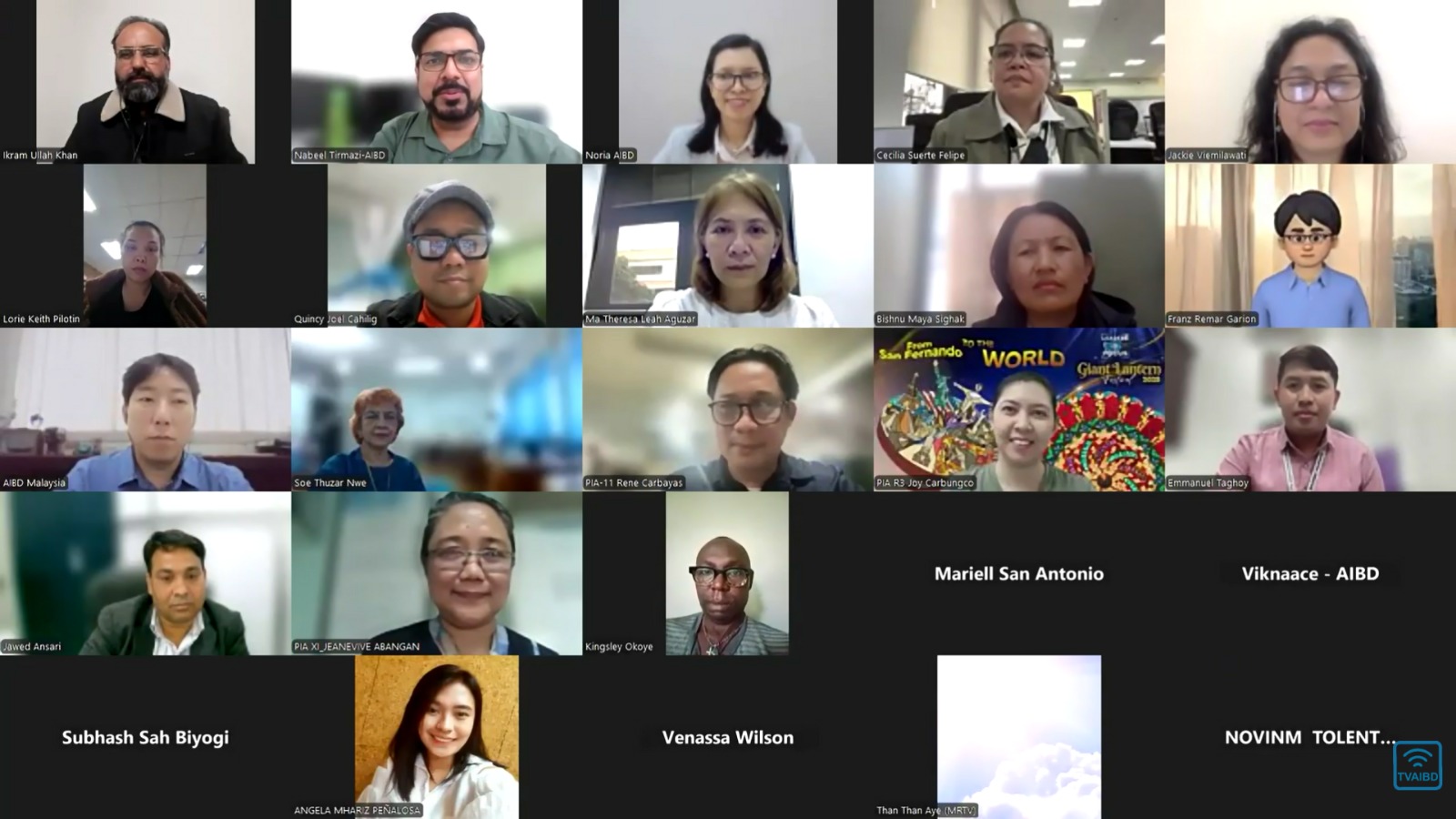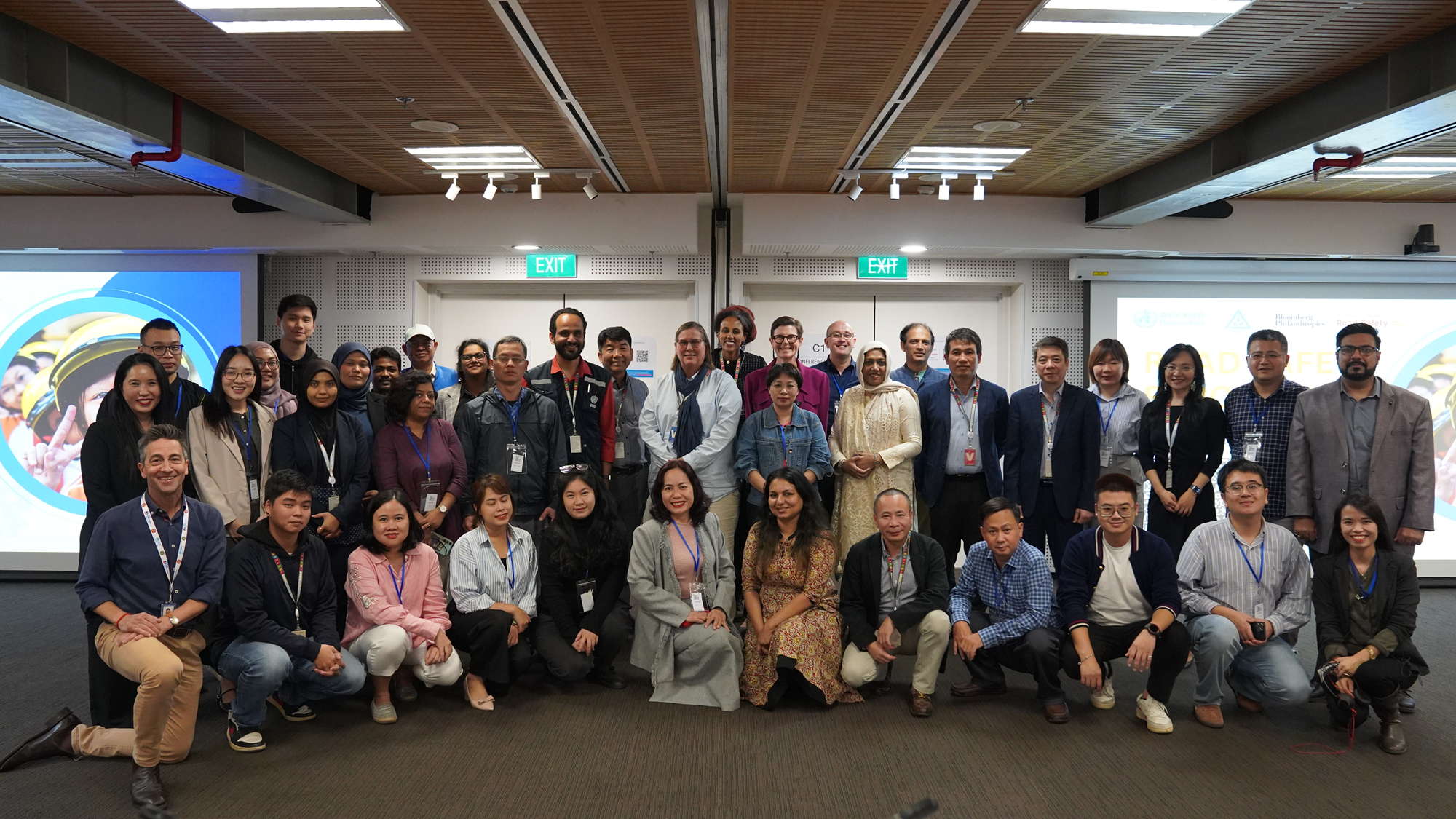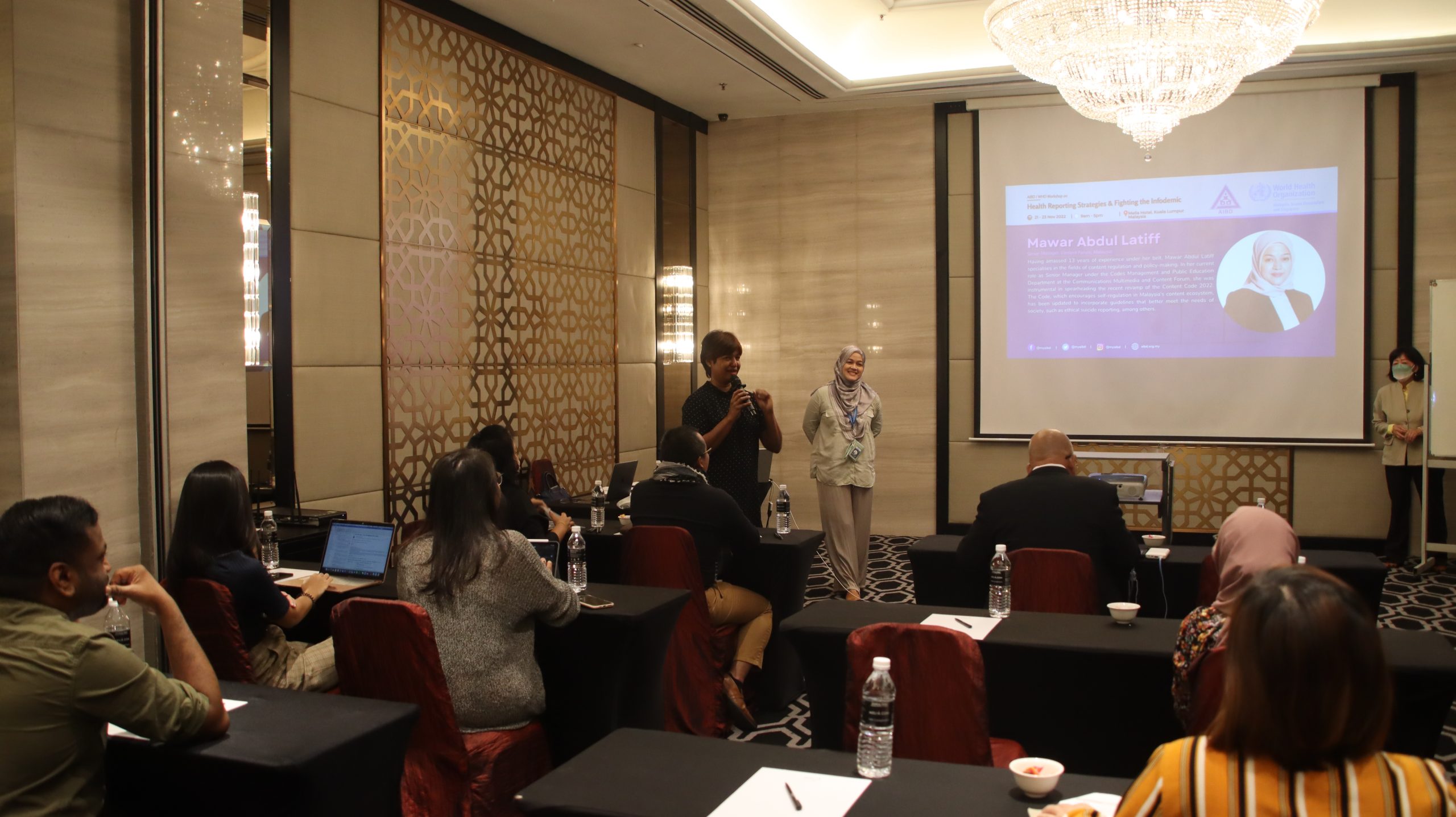
Day 3 – KL Health Journalism workshop
The Communications and Multimedia Content Forum of Malaysia (Content Forum) held a nationwide public consultation exercise last year as part of the Content Code revamp exercise. The Content Code 2022 went into effect on May 30 this year.
The revised Content Code 2022 sets self-regulatory standards for Malaysia’s content ecosystem. These standards encourage creativity, innovation, and the healthy growth of a dynamic industry that is always changing in a way that respects Malaysian values and traditions.
According to Ms Mawar Abdul Latiff, Senior Manager of Codes Management and Public Education at the Communications and Multimedia Content Forum of Malaysia (Content Forum), the Content Code 2022 includes eight key enhancements to address policy gaps in content regulation and to empower consumers to better practice self-regulation.
These enhancements are: Children in Advertising; Accessibility for Persons with Disabilities; Suicide Prevention Awareness; Use of Religion in Advertising; Online Abuse and Gender-based Violence; Influencers and Online Marketplaces; False Content; and Disclosing Advertisements.
She presented her insights to 15 professionals from the electronic and print media at the Health Reporting Strategies and Fighting the Infodemic workshop hosted by the Asia-Pacific Institute of Broadcasting Development (AIBD) and the World Health Organisation (WHO) on November 23, 2022.
The Guidelines for Media Reporting on Suicide 2011, published by Malaysia’s Ministry of Health, are also highlighted in the Content Code. The Content Forum aims to spread awareness about how the media should report suicide cases responsibly.
Content Forum is also working with local Institutes of Higher Learning (IHLs) and plans to incorporate the Content Code 2022 into the educational syllabus and curricula as part of the forum’s public education efforts.
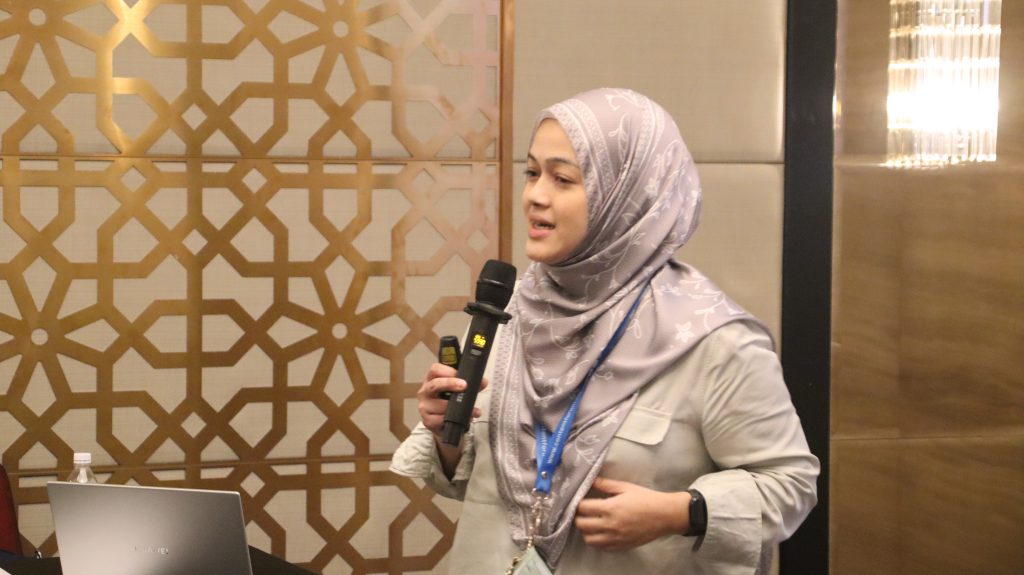
The National Institutes of Health (NIH) Malaysia is a leading health research organisation towards enhancing the health and well-being of the nation.
Its Principal Assistant Director, Ms Khairulnissa Abdul Kadir says the primary role of NIH is to conduct effective and high impact research that will improve the quality of life of Malaysians. Spearheaded by six (6) initiatives under NIH, the research covers Artificial Intelligence and Big Data Analysis; Epidemiology & Public Health; Clinical; Social and Behavioural as well as Application Development.
There are six institutes under the NIH with the respective core functions to meet the desire of the nation in serving the health-related issues of the Malaysian community.
She cited that during the COVID-19 pandemic, findings on social and behavioural research were used as one of the sources of information to advise the government on the actions needed to be taken to control the spread of the virus through timely strategic communication to fight infodemic.
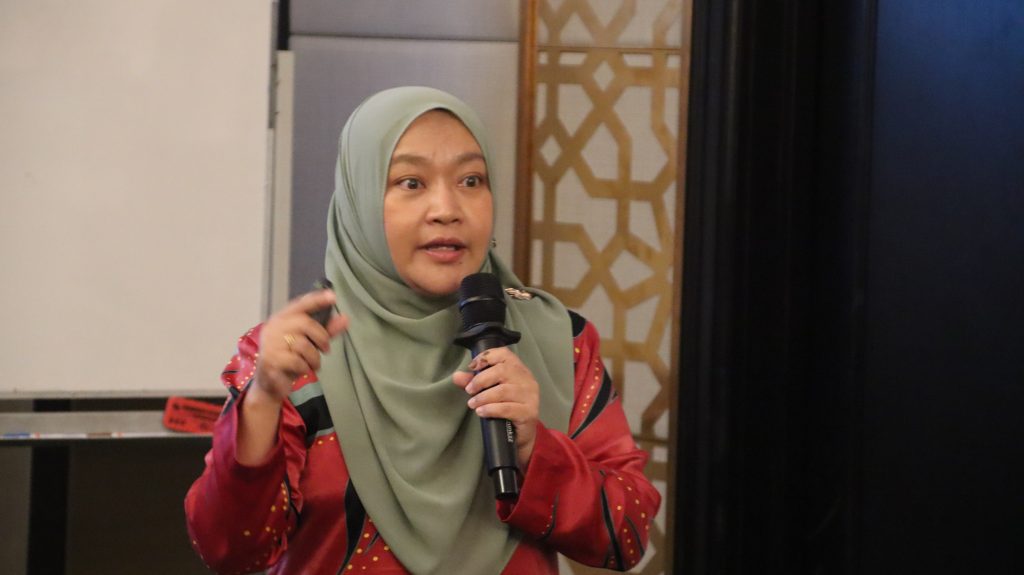
When COVID-19 pandemic halted the world, the public broadcaster of India – Doordarshan (DD), Air India Radio (AIR) under Prasar Bharati with its 470 broadcasting centres across the country remained ‘On AIR’ with 24/7 News services, educational and entertainment programmes for the Citizens.
Joint-Secretary, Ministry of Information & Broadcasting (MIB) India, Mr Senthil Rajan said top-notch medical doctors were engaged daily to share their knowledge through “live phone in” to create awareness on coronavirus.
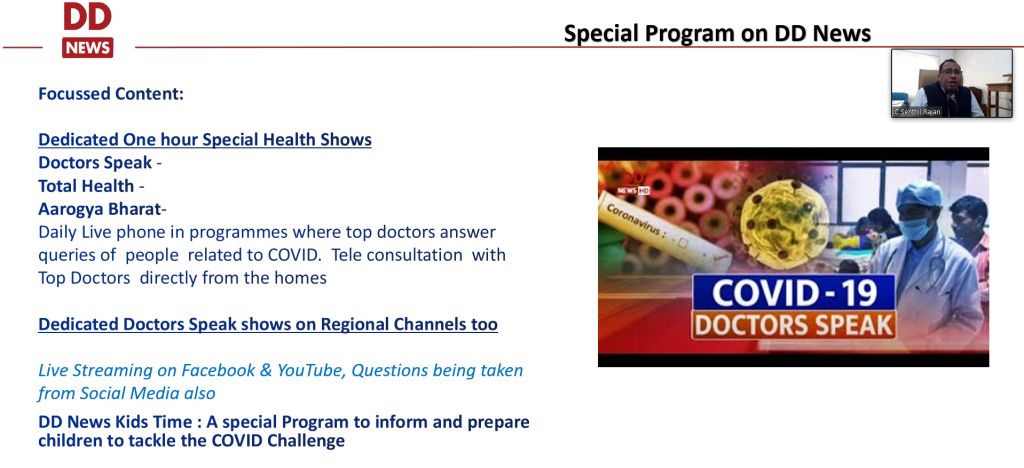
In addition, All India Radio and Doordarshan Channels across the country aired virtual classes for students missing out on Schools and Colleges in collaboration with State and Central government departments.
He said Prasar Bharati’s programmes matched the WHO’s advises on four ways to counter infodemic during COVID. There are:
- Listening to community concern and questions;
- Promoting understanding of risk and health expert advice;
- Building resilience to misinformation; and
- Engaging and empowering communities to take positive action.
Social Media was also extensively utilized to post message on Mobile Messages encouraging adherence to COVID-appropriate behavior/safety protocols, encouraging eligible beneficiaries to get vaccinated and addressing vaccine hesitancy for Behaviour Change Communication.
Stories on patient recoveries and positive developments to dispelling fears on safety and efficacy of vaccines, allaying doubts related to Coronavirus & busting Fake News were also aired regularly. This included advisories to empower citizens with the right information on precautionary measures against Coronavirus and more than 219 crore doses of vaccination have been administrated.
Head of Prasar Bharathi News Service & Digital Platform, Mr Samir Kumar also from India, shared on the topic – utilizing the power of new media for content creation on social media. “Content has its own rules and has different context with different formats”, he said.
Hence, various factors need to be taken into consideration when producing content for online platform in order to create immersive experience for user which has the ultimate choice to watch the event, either via mobile-phone, tablets or TV.
He also outlined 10 things that are important when producing Content. There are relevant, platform appropriate, authentic info-based, original & researched, properly treated according to the media mode, unique & value-added, from the right sources, reflection of the organisation, worth spending time on, educate, inform and entertain.
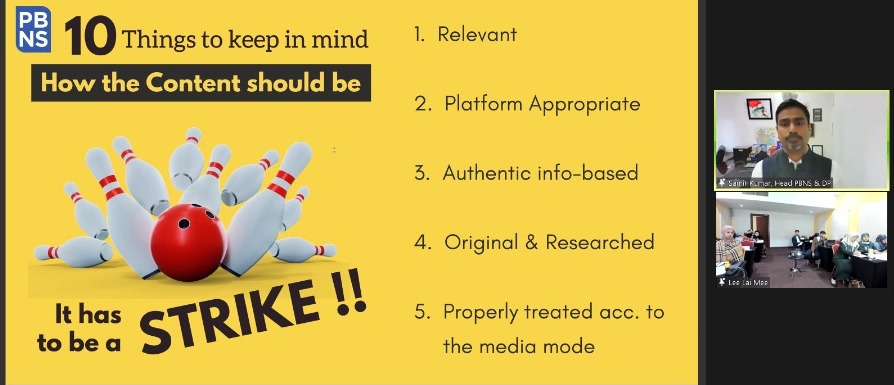
Health Communication Consultant, Ms Meera Sivasothy who coordinated the 3-day workshop also shared her insights on pressing health challenges in Malaysia and SDG3.
She advised the participants to report health-related issues based on evidence. “When gathering information, approach all studies and research findings with a critical eye, ensure crossing disciplinary connection, check with multiple independent sources and don’t sensationalise”, Ms Meera pointed out.
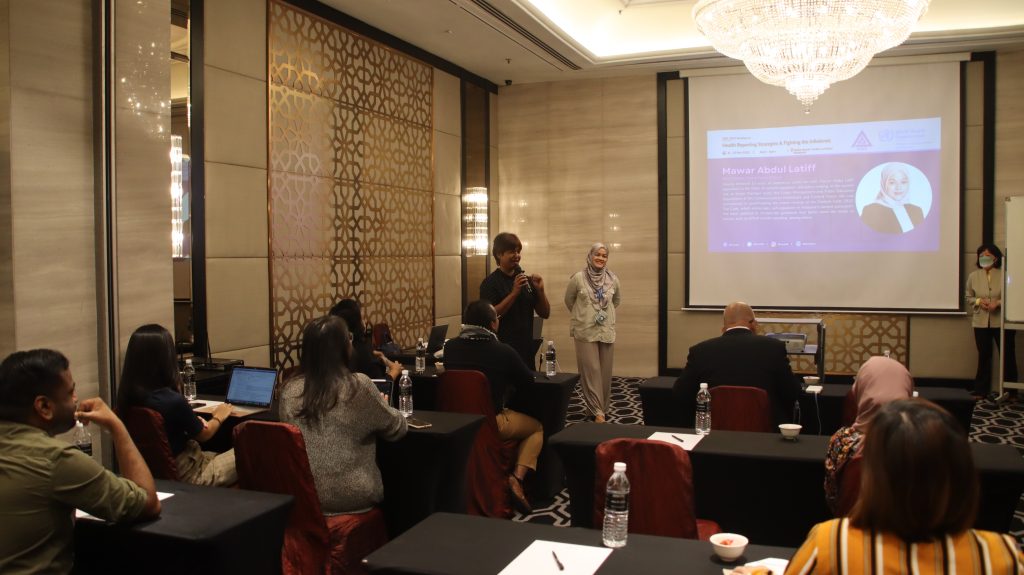
In addition, they can also use other reliable sources like Health Reports, Clinical Trials and Prominent Health Journals as reference for their health reporting stories.




